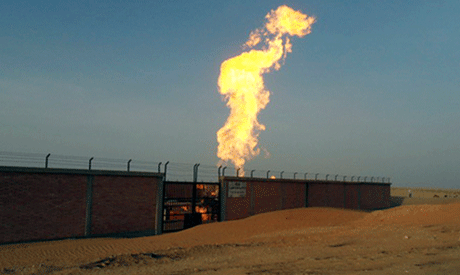
Flames rise over the al-Sabil natural gas terminal after an explosion near the town of El-Arish, Egypt (Photo: AP)
Egypt will sign a deal to resume gas exports to Jordan next month, despite attacks by armed groups on the gas pipeline in Egypt's Sinai region, Egyptian state news agency MENA cited Jordan Energy Minister Khaled Toukan as saying on Monday.
Since a popular uprising ousted Egyptian president Hosni Mubarak in February, armed militants have used the security vacuum in North Sinai to stage attacks on the gas pipeline supplying Jordan and Israel, disrupting flows to both countries.
Toukan said Jordan would pay more for the gas under the new contract (the previous contract was a corrupt deal at far below market prices) but declined to reveal any figures.
He said Jordan remained interested in buying Egyptian gas to meet its needs despite "the attacks this year on the Egyptian gas pipeline in Sinai," as MENA reported.
Attacks on the pipeline cut Egyptian gas exports to Jordan last year by 27 per cent and the decline doubled this year when the pipeline was hit five times, MENA figured.
Jordan normally relies on Egyptian gas to generate 80 per cent of its power and was forced to switch partly to fuel oil and diesel to avoid disruption to electricity supplies, it said.
The previous gas deal between Jordan and Egypt was signed in 2004 was intended to last 15 years.
Egypt has been boosting gas production, but most of the increase covers increased domestic demand as electricity consumption surges in the country of 85 million people.
A modest gas exporter, Egypt also exports gas via liquefied natural gas facilities on its north coast.
Israel, which depends on Egyptian natural gas for 40 per cent of its energy, has also been affected by the repeated interruption of the supply.
Egypt is reportedly preparing a request from the International Centre for the Settlement of Investment Disputes, demanding to re-price the gas it sells to Israel; which is perceived to be at below-market pricing and is, therefore, resented by Egyptian citizens.
Israel claimed earlier that the price it pays for Egyptian gas is on par with international levels, and that it will not engage in any price negotiations as prices already increased about a year ago.
"Eastern Mediterranean Gas Company's price is higher than that of any other Egyptian export venue, is better than other regional exporters receive and is in line with international prices," says Nimrod Novik, a senior Israeli energy executive and an EMG board member.
To protect both sides' interests, Israel has recently approved the deployment of extra Egyptian army troops in Sinai to clamp down on militants who have staged attacks on the gas pipeline.
Militant attacks on Al Arish police station (on the Egyptian side) and Eilat (on the Israeli side) demonstrated the need for tight secuirty presence in the desert-dominated peninsula.
The number of Egyptian forces in Sinai is limited by the terms of the 1979 Israel-Egypt peace treaty, but Egypt has requested to reinforce its security presence there to maintain a strong grip on the strategic peninsula.
Short link: